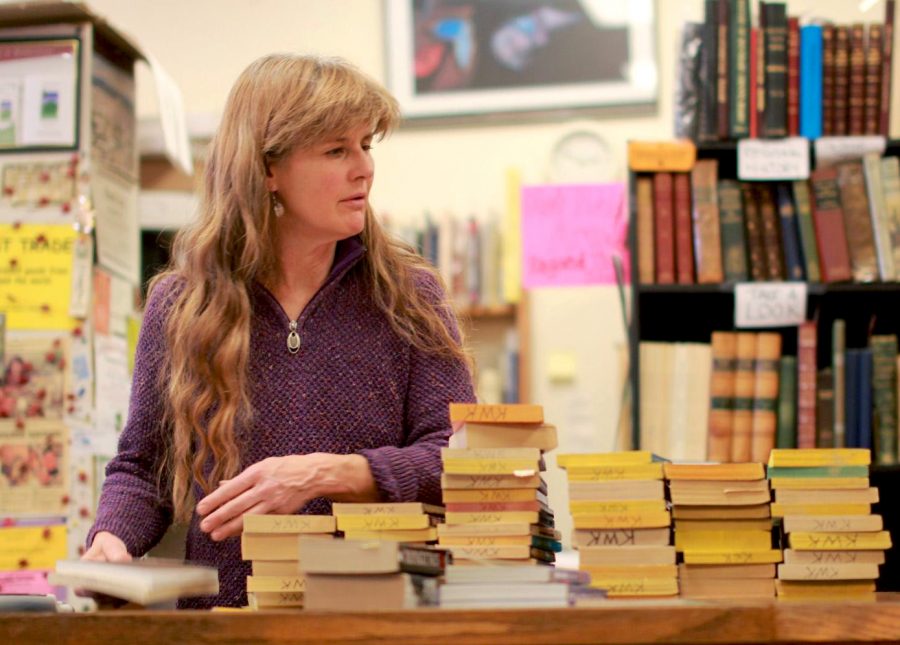Local businesses are more than just products
University should encourage students to shop in Pullman, experience non-corporate difference
RACHEL SUN | DAILY EVERGREEN FILE
Monique Slipher helps customers at Brused Books on Oct. 18, 2017 in downtown Pullman. WSU should do more to support the community by encouraging students to shop at local businesses and get off campus.
October 10, 2018
At the WSU Pullman campus, everything a student needs is available right here. There’s Cougar Health Services, CougTech, The Bookie and two recreation centers, not to mention food services ranging from dining halls and small markets to espresso shops and chain restaurants catering to all tastes.
WSU accommodates its students and it shows in the sheer variety of the services provided. They are broad enough for first-year students to live here without so much as stepping off campus.
The town of Pullman becomes a peripheral, foreign place. Many of its businesses are seemingly redundant and inconvenient compared with our campus. Because of this, they are too often overlooked.
Pullman may not have the sheer resources and selection of WSU, but the personal and quaint environment sets its businesses apart from sites on campus.
“What many people come in and say is ‘I still like the feel of a book in my hands and the smell of the pages,’ ” said Monique Slipher, who has been a bookkeeper at Brused Books for the last 15 years.
Brused Books has been in Pullman for 37 years, and it shows.
On entering the store, there’s no entrance chime to herald your arrival. Creaking floors beneath as you step are the only show of anyone’s presence, and the smell of aging paper fills the store more pleasantly than any incense could. Shelves are orderly, though they often overflow from their boundaries and spill onto the floor, pooling into stacks.
The selection may not be as great as those found at the Holland-Terrell libraries, but the ability to browse and discover in its close quarters makes it far more intimate.
It’s as exemplary a model for the draws of local business as any.
The experience of someone who knows books and having a curated selection to choose from is the main appeal of their business, Slipher said.
While places around campus are convenient, local businesses offer personal treatment to unique blends of their respective services, be it food, entertainment or style.
It’s this difference that should keep students visiting them, positively impacting both the visitor and the community in a variety of ways. But without easy access to these areas or even an awareness of their existence, many students miss out and local stores suffer for it.
For mutual benefit, downtown Pullman should be made more readily accessible and openly advertised to WSU students.
Making alternative means of reaching Pullman has proven effective — the creation of bike paths several years back brought in more student traffic, Slipher said.
But with several bus routes interweaving Pullman and WSU, footpaths aplenty and the aforementioned bike routes, it’s clear one’s actual ability to reach these places isn’t the issue.
The problem lies in student encouragement to visit these places. Unfamiliar, uninformed or simply unappealing in prospect, students haven’t had a reason to undergo the 40-minute trek it takes to get downtown and back when they can walk to almost anywhere on campus in a fraction of the time.
To support the local businesses of Pullman and better integrate our campus with the community, WSU should make a greater effort to consider them a beneficial element and include them in their programs.
This could take form in a sample game night at Palouse Games where students are invited to test some of the products they carry, integrating restaurants like Oasis as occasional meeting places and caterers of clubs or simply having more local events advertised around campus.
The experiences Pullman offers should not be hidden in the shadow of WSU’s services and it would be to everyone’s benefit to highlight them in more of our programs.








